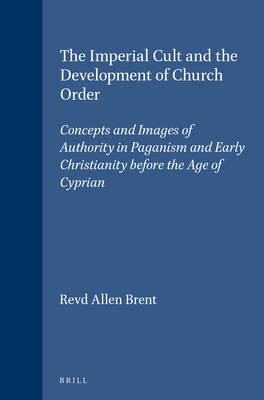
- Afhalen na 1 uur in een winkel met voorraad
- Gratis thuislevering in België vanaf € 30
- Ruim aanbod met 7 miljoen producten
- Afhalen na 1 uur in een winkel met voorraad
- Gratis thuislevering in België vanaf € 30
- Ruim aanbod met 7 miljoen producten
Zoeken
The Imperial Cult and the Development of Church Order
Concepts and Images of Authority in Paganism and Early Christianity Before the Age of Cyprian
Revd Allen Brent
€ 392,45
+ 784 punten
Omschrijving
Recent studies have re-assessed Emperor worship as a genuinely religious response to the metaphysics of social order. Brent argues that Augustus' revolution represented a genuinely religious reformation of Republican religion that had failed in its metaphysical objectives. Against this backcloth, Luke, John the Seer, Clement, Ignatius and the Apologists refashioned Christian theology as an alternative answer to that metaphysical failure. Callistus and Pseudo-Hippolytus gave different responses to Severan images of imperial power. The early, Monarchian theology of the Trinity was thus to become a reflection of imperial culture and its justification that was later to be articulated both in Neo-Platonism, and in Cyprian's view of episcopal Order.
Contra-cultural theory is employed as a sociological model to examine the interaction between developing Pagan and Christian social order.
Contra-cultural theory is employed as a sociological model to examine the interaction between developing Pagan and Christian social order.
Specificaties
Betrokkenen
- Auteur(s):
- Uitgeverij:
Inhoud
- Aantal bladzijden:
- 424
- Taal:
- Engels
- Reeks:
- Reeksnummer:
- nr. 45
Eigenschappen
- Productcode (EAN):
- 9789004114203
- Verschijningsdatum:
- 29/10/1999
- Uitvoering:
- Hardcover
- Formaat:
- Genaaid
- Afmetingen:
- 244 mm x 166 mm
- Gewicht:
- 889 g

Alleen bij Standaard Boekhandel
+ 784 punten op je klantenkaart van Standaard Boekhandel
Beoordelingen
We publiceren alleen reviews die voldoen aan de voorwaarden voor reviews. Bekijk onze voorwaarden voor reviews.








